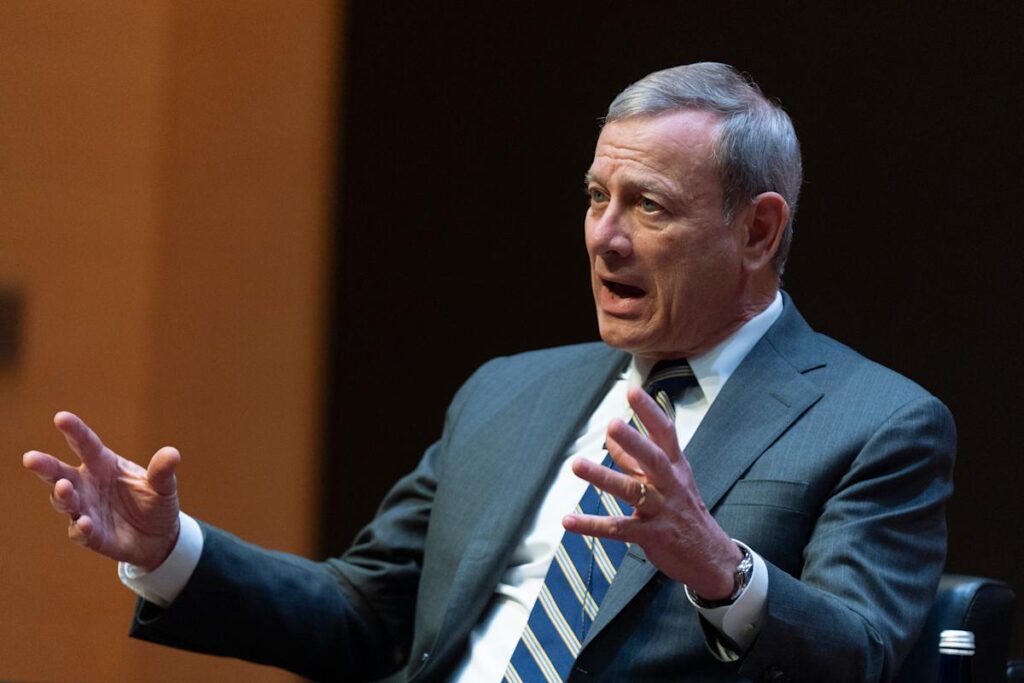Chief Justice John Roberts described the rule of law as “endangered” and warned against “trashing the justices,” but speaking in Washington Monday he didn’t point fingers directly at President Donald Trump or his allies for publicly excoriating judges who’ve ruled against aspects of Trump’s agenda.
“The notion that rule of law governs is the basic proposition,” Roberts said during an appearance at Georgetown Law. “Certainly as a matter of theory, but also as a matter of practice, we need to stop and reflect every now and then how rare that is, certainly rare throughout history, and rare in the world today.”
As many legal experts express grave concern about Trump’s attacks on law firms and with several federal judges advancing inquiries into whether the administration is refusing to comply with court orders, Roberts took a longer-term view Monday. He blamed schools for shortchanging civics education and leaving students with little understanding of the structure of U.S. government or the role of the courts.
“That’s really too bad,” the chief justice told graduating students at the law school. “We’re developing a situation where a whole group of young people is growing up having no real sense about how our system of justice works.”
Roberts suggested some recent verbal attacks on the justices had gone too far, but he gave no specific examples. “The court has obviously made mistakes throughout its history, and those should be criticized, so long as it is in terms of the decision, really, and not ad hominem against the justices. I just think that doesn’t do any good,” the chief justice said.
In March, Roberts responded quickly when Trump called U.S. District Judge James Boasberg “crooked” and urged he be impeached for his rulings related to the administration’s deportation of hundreds of men to a notorious prison in El Salvador.
“Impeachment is not an appropriate response to disagreement concerning a judicial decision,” Roberts, an appointee of George W. Bush, said at the time.
In a speech earlier this month, Roberts’ most junior colleague — Justice Ketanji Brown Jackson, a Biden appointee — condemned “threats and harassment” that she said amounted to “attacks on our democracy [that] ultimately risk undermining our Constitution and the rule of law.”
Roberts’ public tone since Jackson’s remarks has been notably less dire. At a judicial event in Buffalo last week, he repeated his earlier written statement opposing impeachment of judges over decisions, but passed up the opportunity to elaborate.
Roberts assured the students Monday that the tense public atmosphere surrounding the judiciary and the fact that the justices “disagree a lot” hasn’t led to the kind of “toxic” personal strife that has permeated the Supreme Court at various times in its history.
“We have to work together on these things that are difficult. You find a way to get along,” Roberts said. “It’s a long job. If you’re sort of really at each other’s throats with bad feelings and stuff like that, it just — it’s not a good way to function. … We do have to address some very, very difficult things, and we’re the only people who are doing it.”
For the second time in a week, Roberts, 70, signaled that he has no plans to step down from the court. As he discussed the recent death of retired Justice David Souter, Roberts recalled his former colleague’s “unconventional” decision to step down in 2009 at age 69 without any known health issues or indication his mind was declining. Roberts said Souter said he wanted to return to New Hampshire and “get back to reading some good books.”
“There aren’t many people who would have that kind of perspective, including myself — I wouldn’t claim to have that kind of view — but sort of a very good, balanced way of looking at all of it,” the chief justice said.
Read the full article here


